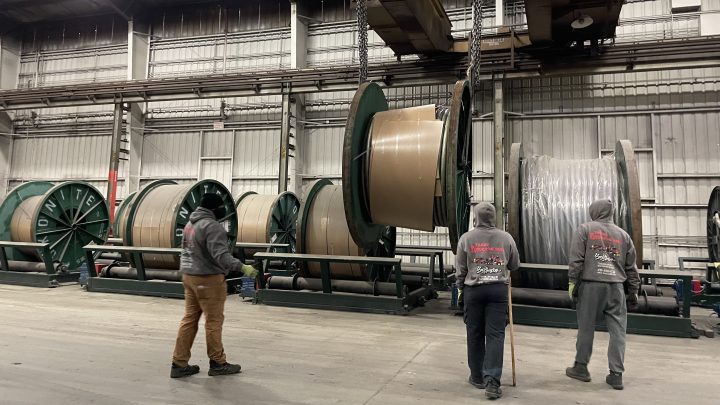
For thousands of workers who rely on Baltimore’s port, work has slowed or stopped
For thousands of workers who rely on Baltimore’s port, work has slowed or stopped

This week, we learned about a bill before the Maryland legislature to help people whose jobs were affected by the collapse of the Francis Scott Key Bridge. There’s a hearing on that proposal scheduled for Thursday.
But in the meantime, work has slowed, or even stopped, for the tens of thousands of people who work in and around the port. This includes longshoremen, who unload the container ships coming into the port, the warehouse workers who store those containers and the servers at nearby restaurants who feed all of the above.
At Trans American Trucking & Warehouse’s location near the Port of Baltimore, warehouse manager Mill Cooper guided a team using an overhead crane to move an 8,600-pound reel of telecommunications wire. Wooden freight containers lined the sides of the giant warehouse.
But Cooper said that with no new ships coming into the port right now, there’s not as much to store or transport. And that makes him nervous.
“When a warehouse starts looking empty, I know they ain’t going to need nobody to babysit no freight,” he said.
Trans American still has some domestic shipments coming in here by truck. The company isn’t planning to lay anyone off and instead will encourage its Baltimore employees to use vacation time now.
“Once everything is good again, things are going to be rolling like they used to be, so we’ll kind of need all hands on deck for that,” said Craig McGraw, Trans American’s VP of sales and marketing.
But a few miles south, at the longshoremen’s union office, people are already feeling the pain. Local President Scott Cowan’s bagpipe ringtone is going off pretty much all the time. He said he’s hearing a lot from members who are worried about how long this will last.
Right now, the vast majority of them are out of work.
“Some are collecting unemployment, some are working other jobs, and some are still working, but not many,” he said.
Cowan is advocating for financial relief for the longshoremen now, but he’s also worried that the longer the waterway is closed, the more likely it is that Baltimore will lose business to other East Coast cities that it’s essentially competing with.
“If we lose cargo to other ports, it will take time to gain that cargo or different cargo back to take its place. It could turn a short-term problem into a long-term problem,” he said.
The lack of work at the port is also affecting the businesses in the area where longshoremen are regulars.
At Vinny’s Cafe, there would usually be a line out the door at noon, with port workers buying subs and slices of a giant, 30-inch pizza it sells.
Fabrizio Scotto’s family owns the restaurant — his dad is Vinny. He said it’s been a lot quieter this past week.
“Definitely see the impact, port-wise,” he said. “But, you know, they can’t go to work. So that’s why we don’t see them.”
At one table, Mark McCluskey, a retired tugboat captain who used to work in the port, was finishing up lunch with a couple of friends.
He said the port being cut off feels like just another blow to an area that’s already lost a bunch of industrial jobs.
“They’ll get through it. They’re kind of tough, they’ll get through it. But it just feels like a lot of time, like, why?” he said.
One of his friends, Chip Keller, said the bridge collapse feels like “another test” for the community.
One thing that gives this group hope: The people clearing the channel are the best around, they said.
Essentially, they have faith in the workers doing their jobs, so that all the port workers will eventually be able to return to theirs.
There’s a lot happening in the world. Through it all, Marketplace is here for you.
You rely on Marketplace to break down the world’s events and tell you how it affects you in a fact-based, approachable way. We rely on your financial support to keep making that possible.
Your donation today powers the independent journalism that you rely on. For just $5/month, you can help sustain Marketplace so we can keep reporting on the things that matter to you.












